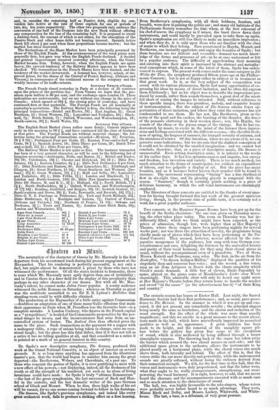Dr. Spohr's new descriptive symphony, 27,e Seasons, produced this week
at the Grand National Concerts, is an object of interest on several grounds. It is so long since anything has appeared from the illustrious master's pen, that the world had begun to number him among the great departed—the Beethovens, Webers, and Cherubinis, of a past age. To those who venerate the genius of Spohr, it is ever gratifying to meet with a new effort of his powers,—not displaying, indeed, all the freshness of his youth or all the strength of his manhood, yet such as he alone of living musicians could have made : for Spohr is truly "ultimus B.omanorum" —the last of the great symphonists, the last successor of Bach and Han- del in the oratorio, and the last dramatic writer of the pure German school of Gluck and Mozart. When he dies, these high walks of his art will be vacant, for no one seems coming forward to follow in his footsteps. The Seasons, like Spohr's previous symphonies, and indeed like every great orchestral work, fails to produce a striking effect on a first hearing. Even Beethoven's symphonies, with all their boldness, freedom, and breadth, were slow in gaining the public ear and many old habitues of the Philharmonic Society remember the tide When, at the first rehearsal of ins chef-d'cauvre the symphony in C minor, the band threw down their instruments, and could hardly be prevailed upon to take them up again. Spohr'a symphonies are still less likely to make an immediate impression; and when they do, it is only upon those who are familiar with the class of music to which they belong. Ears accustomed to Haydn, Mozart, and Beethoven, can instantly appreciate and enjoy the beauties of Spohr; but these beauties are too delicate and recondite—demand too much know- ledge of the forms and processes of art—to be at once understood or felt by a popular audience. The difficulty of apprehending their meaning and entering into their spirit is increased by the abstract and metaphy- sical conceptions which, in some of the latest of them, Spohr has endea- voured to express. The present work comes under the same category as Die lVeihe der Rine, the symphony produced fifteen years ago at the Philhar- monic Concerts; but is not so happy either in subject or in treatment as that great work. In it, as the very subject of the composition was sound, with its various phcenomena, Spohr had many opportunities of ex- pressing his ideas by means of direct imitation, and he often did express them felicitously ; but as his object was to describe the impressions pro- duced by sounds, rather than sounds themselves, a great deal of the music fell short of raising the images he intended. Still, without reference to these specific images, there was grandeur, melody, and exquisite beauty of instrumentation. But the subject of The Seasons admits fewer op- portunities of direct imitation, and where they exist the composer has not condescended to use them. He has not, like Beethoven, given us the notes of the quail and the cuckoo, the bursting of the thunder, the dance of the peasants clattering in their wooden shoes ; nor, like Haydn, the sounds of the chase or the joyous songs of the vintage. But he has en- deavoured, by music, to excite in the mind of the listener those impres- sions and feelings associated with the different seasons,—the cheerful fresh- ness of spring, the languor of summer, the tranquil serenity of autumn, and the sternness of winter. Of this intention, when we are aware of it, we can perceive some indications; but we are sure that the slightest conception of it could not be obtained by the unaided imagination : and we cannot but conclude therefore, that, as a piece of descriptive music, 7'114 Seasons is unsuccessful. Even setting description aside, it is inferior to the works of his earlier days. It has less spontaneousness and impulse, less energy and freedom, less invention and variety. There is too much method, too much attention to the forms of counterpoint, too evident an expenditure of labour, and too palpable a display of art. But the piece has many beauties, and as it becomes better known their number will be found to increase. The movement representing "Spring" has a fine rhythmical flow in six-eight time, and its pleasing gayety is congenial with the season. "Summer," though it certainly paints nothing, is a piece of delicious harmony, in which the soft wind instruments are charmingly employed.
The Directors of these concerts are entitled to the thanks of every ama- teur for having brought forward this last work of the greatest musician living ; though, in the present state of public taste, it 19 certainly not a work fora great popular audience.


























 Previous page
Previous page